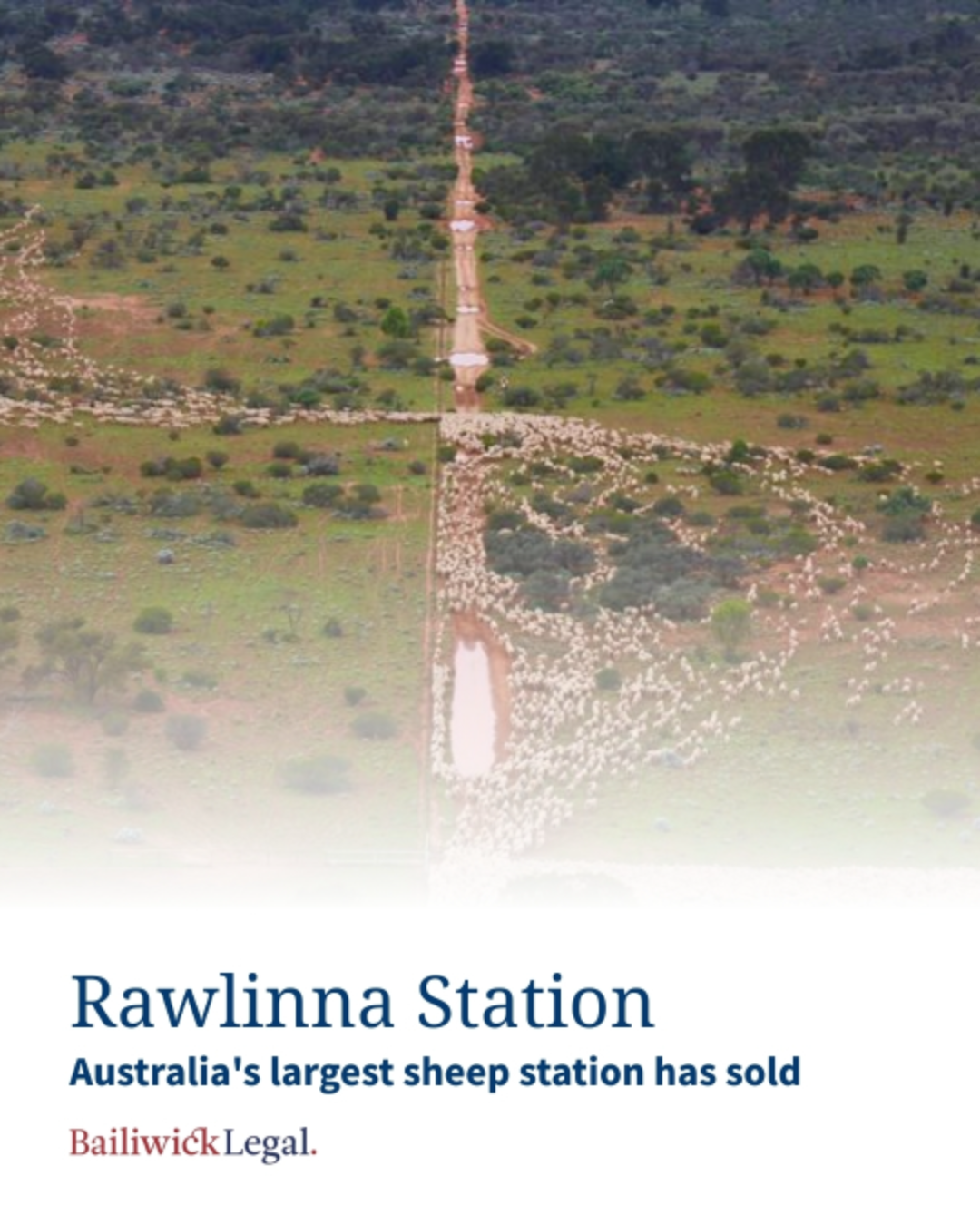Should you open the Farm Gate to a Mining or Oil & Gas Company?
February 19, 2026
Author name
Over the last few years there has been a noticeable increase in mineral exploration in Western Australia, particularly within the southwest region.
So, when someone out of the blue turns up at your door offering a deal for access rights, it is in your interest to seek legal advice. At Bailiwick Legal, we have assisted many land owners and farm businesses in such circumstances.
The following article provides some general advice about access and the rights of the farm land holders. The information in this article is general in nature and is not legal advice. We recommend that you speak to your legal advisor before taking any action.
Mining
First we are going to have a look at the mining industry, and what your options are when a representative of a mining company seeks access to explore for mineral resources on your land.
“Right of Veto”
Under the Mining Act 1981, the owner or occupier of land under cultivation (usually referred to as “arable land”) has what is commonly called a “right of veto”: that is, the right to politely say “No, you cannot explore on my land”.
This right is especially useful today as farmers are becoming increasingly wary about who is accessing their land and importantly, what biosecurity measures are proposed to be taken if access is granted.
If you decide to exercise your right of veto, you can feel secure in the knowledge that there is nothing more that a mining company can do, as there is no mechanism under the Mining Act to force you to allow access.
However, this right of veto only protects you if you haven’t previously given permission to a mining company to access and explore on your land. If you have already consented to access in the past, your rights are likely to be significantly limited.
Granting Access
Now, if you have no objection to a mining company having access to your land we advise that you negotiate an “access and compensation agreement”. If you take this course, you also need to be very careful.
You need to take a good look at the terms of any access and compensation agreement proposed and make sure granting access will not leave you disadvantaged or displace your right to farm the land. It is important to know what the mining company is looking for, what works it is proposing to undertake, the timing of those works and what compensation is being offered in return for access to the land. Also, question what biosecurity measures the mining company plans to adopt, and again importantly, how these activities are likley to impact on your production program.
The Mining Register
Under the Mining Act the Department of Mines is required to maintain a register of “mining tenements”. This register is a critical reference for ascertaining who owns a mining tenement and what land the mining tenement falls over.
If you have already granted a mining company access to your land it is likely that your land has been formally “added” to the register for the relevant mining tenement. If this is the case, then it will likely be easier for a mining company to obtain a mining lease (where there is a commercial ore body), and your right may be limited to negotiating further compensation.
The Price of Not Setting a Price
It is of some concern the amount of times I have been informed by landowners or occupiers of land, that they have simply allowed a company to explore on their land where no access and compensation agreement, or any agreement, has been reached. In such circumstances, land owners and occupiers may well be limiting or negating any rights they have under the Mining Act.
Oil and Gas
When considering exploration for hydrocarbons, the laws around access to farm land are significantly different.
Under the Petroleum and Geothermal Energy Resources Act 1967, there is no such thing as a “right of veto”, and if an agreement to access and compensation is not reached, one of the parties can commence proceedings in the nearest Magistrates Court to seek a determination of compensation.
In our experience, on most occasions the parties reach an agreement in relation to access, timing, compensation and biosecurity measures, to name a few of the key components to an access agreement. However, occassionally companies seeking to explore for hydrocarbons on farm land (by drilling an exploration well) have commenced an action in the Magistrates Court because an agreement to compensation has not been reached. All of these have settled in one way or another and none, as yet, have gone to a trial.
In 2015, APPEA (Australian Petroleum Production and Exploration Association), WAFarmers, the PGA and vegesWA negotiated a template Access and Compensation Agreement for use within the rural sector. This template is available from the organisations named and is a useful tool for farmers.
Not all companies use this template, and because the land owner and occupier do not have a “right of veto”, we recommend the obtaining of advice and assistance from your lawyer as soon as possible if approached.
Conclusion
The intricacies of the legal relationship between farmers and mining or oil and gas companies is substantial.
Given our experience with these agreements and dealing with such companies, the team at Bailiwick Legal are well placed available to provide you with guidance, and ensure that you are not only aware of your rights, but also to assist you in engaging your rights to best suit your interests.
So, if you are asked for access to your land by a mining company, or by company that wants to drill an exploration well (or even a production well), and you're wondering if you should agree to that access, pause and take a step back and then give us a call. We are here to help you with that decision.

Bailiwick Legal has been honoured to support Forever Wild over the past few years as they delivered one of the most significant conservation land acquisition programs undertaken in Western Australia. Our team assisted Forever Wild with the strategic purchase of four pastoral stations, Narndee , Boodanoo , Meeline and Challa , transactions that now connect three State Reserves and protect more than 12,000 square kilometres of land. To put that scale into perspective, the combined area is approximately five times the size of the ACT and nearly one-fifth the size of Tasmania . Navigating complexity at scale These were not straightforward property transactions. Each acquisition involved: Multiple pastoral leases Layered regulatory and approval pathways Significant operational and on-ground assets Numerous stakeholders across government, industry and land management Our role was to guide Forever Wild through this complexity with clarity, precision and confidence, ensuring each transaction progressed efficiently while managing risk and safeguarding long-term objectives. “ Forever Wild is creating a world-leading model for nature funding that demonstrates we can manage viable, working pastoral stations whilst also restoring and protecting local ecological flora and fauna, and engaging and supporting Indigenous people and local communities. Complex & challenging, but this initiative could literally change the world .” Jessica Brunner - Director, Bailiwick Legal A growing and evolving legal landscape Large-scale conservation acquisitions sit within an emerging and increasingly complex legal field , intersecting land tenure, pastoral regulation, environmental frameworks and commercial considerations. These matters demand a deep understanding of both the legal mechanics and the practical realities of operating in regional and remote Australia. Our team’s experience in agribusiness, pastoral land transactions and regulatory approvals allowed us to support Forever Wild at every stage, from strategic structuring through to completion. Proud to support leadership in nature finance Forever Wild is widely recognised as an industry leader and a steadfast advocate for nature finance initiatives , helping pave the way for greater accessibility and innovation in conservation funding and land stewardship. We are proud to have contributed our relationships, expertise and practical legal insight to help Forever Wild achieve its vision, and to have played a role, however small, in shaping a groundbreaking future for conservation in Australia. At Bailiwick Legal, we value the opportunity to work alongside organisations that are thinking long-term, acting boldly, and creating outcomes that extend well beyond the transaction itself. For assistance with all of your agribusiness needs, contact Bailiwick Legal on 08 9321 5451 or email office@bailiwicklegal.com.au For further information about our legal services, please visit our website: https://www.bailiwicklegal.com.au The above information is a summary and overview of the matters discussed. This publication does not constitute legal advice and you should seek legal or other professional advice before acting or relying on any of the content.

Bailiwick Legal Advises on Landmark Acquisition of Rawlinna Station by Consolidated Pastoral Company
Bailiwick Legal is proud to have acted for Consolidated Pastoral Company (CPC) in its successful acquisition of Rawlinna Station , Australia’s largest sheep station, located on the remote Nullarbor Plain in Western Australia. Spanning over 1 million hectares and running approximately 30,000 sheep , Rawlinna is an iconic pastoral asset with a rich legacy, having been held by the MacLachlan family’s Jumbuck Pastoral Company since its establishment in 1962. The sale marks the first change of ownership in over six decades and was finalised following formal approval from the Western Australian Government for the transfer of the pastoral leases. This transaction involved navigating: The transfer of three separate pastoral leases Coordination across multiple vendor entities Consideration of livestock and operating assets Fulfilment of regulatory and compliance requirements, including WA lease approval processes Bailiwick Legal is a boutique agricultural and regional law firm , proudly based in Perth and Bridgetown, Western Australia. Our role in this acquisition demonstrates that deep sector knowledge, local insight, and personalised legal support are crucial for agribusiness clients managing complex, high-value transactions. Our team, led by our regionally-based solicitor, Matilda Lloyd, provided end-to-end legal and strategic support, including: Due diligence on land tenure and operating assets Contract negotiation and preparation Advice on regulatory approvals and compliance Strategic coordination with CPC’s internal and external stakeholders to ensure a smooth and timely settlement We are honoured to have supported CPC in this milestone acquisition and look forward to watching Rawlinna’s next chapter unfolds. At Bailiwick Legal, we believe that regional expertise, deep industry knowledge, and relationship-based service remain essential to agribusiness success, no matter the scale. Congratulations to all parties involved, including the MacLachlan family, whose stewardship of Rawlinna leaves a lasting legacy in Australian agriculture. – The Bailiwick Legal Team Working alongside agribusinesses to grow, transition, and thrive . For assistance with all of your agribusiness needs, contact Bailiwick Legal on 08 9321 5451 or email office@bailiwicklegal.com.au By Matilda Lloyd (Associate) For further information about our legal services, please visit our website: https://www.bailiwicklegal.com.au The above information is a summary and overview of the matters discussed. This publication does not constitute legal advice and you should seek legal or other professional advice before acting or relying on any of the content.











